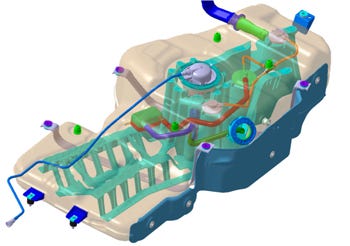Blowmolding tech pushes plastic fuel tanks into hybrids
A new manufacturing process allows hybrid-electric vehicle manufacturers to replace current steel designs with quieter, lighter, low-emission plastic tanks, pushing plastic into a market space that it previously couldn't serve. TI Automotive says the product is made possible by its Tank Advanced Process Technology (TAPT), which is based on traditional blowmolding, but with several tooling enhancements.
March 4, 2011
A new manufacturing process allows hybrid-electric vehicle manufacturers to replace current steel designs with quieter, lighter, low-emission plastic tanks, pushing plastic into a market space that it previously couldn't serve. TI Automotive says the product is made possible by its Tank Advanced Process Technology (TAPT), which is based on traditional blowmolding, but with several tooling enhancements.

TI Automotive hybrid vehicle plastic fuel tank.
After the parison drops down into the mold, it is initially shaped with air pressure without fully closing the two mold halves and is then cut along the parting line. This allows a robot to then insert key fuel-system components, like structural rib sections, slosh baffles, and additional plastic for noise reduction and increased structural integrity. The mold then fully closes and final air pressure is applied to form the plastic fuel tank's final shape.Al Deane, chief technology officer, TI Automotive, says that the unique powertrain operation and vapor purge cycle of hybrid-electric vehicles can create an increased amount of vapor pressure within the fuel tank, requiring changes to tank design. Deane also notes that because hybrid electric vehicles are so quiet in the full-electric mode, fuel sloshing is more audible to passengers. "With TAPT, we can create complex plastic fuel tank shapes and sizes that can handle the pressure and noise concerns," Deane says.
TI introduced TAPT at the ITB Automotive Energy Storage and Fuel Systems 2011 Conference in Novi, MI. The TAPT process will enter production in 2012, with TI having been awarded development contracts for one European and two Asian automakers for HEV pressurized fuel tanks.
Last October, TI Automotive received an order for six million plastic filler pipes and up to 3 million fuel tanks systems from Volkswagen, utilizing TI's ship in a bottle (SIB) process.
About the Author(s)
You May Also Like


